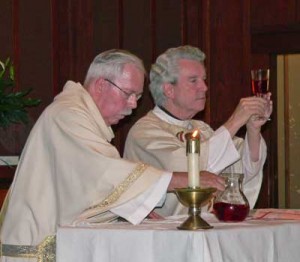RECENTLY I CAME across the musings of a young Jesuit, Father Mark Mossa, about the phrase “work of human hands” which occurs in the Preparation of Gifts (= Offertory) in the New Mass. This prompted a brief correspondence the meaning of the phrase.
The full text of the priest’s blog posting is here, and the pertinent excerpts were the following:
This past weekend I joined the nearby parish where I help out for their patronal feast. It was a wonderful celebration. The church was packed. One of the bishops came and presided at mass (doing so both in English and Spanish—I was impressed). Everyone was well-dressed. At the offertory, representatives of various different countries came forward dressed in ethnic costume to present some native foods. Then came the offering of the bread and the wine…
I’ve been taking a class on Eucharist and social justice, where we discuss the meaning and implications of our Eucharistic celebrations, like the Mass we had this night. At every Mass I speak the words “the work of human hands,” often not really thinking about what that means. This class is pushing me to be attentive to such things. What we are saying at that point in the mass, in fact, is that our Eucharist is possible because the work of so many brings the bread and wine to us so that we can offer it as a gift to each other… So, when we hear “the work of human hands” we are reminded that our Eucharistic food depends on the work of… many of those rough-handed people who come to church each Sunday.
My comment was as follows.
Dear Father: You may find the following information interesting.
I recently published a critique of the Mass of Paul VI entititled “Work of Human Hands,” which is available from philotheapress.com
I explain that the phrase in the post-Vatican II rite for the Preparation of the Gifts in the modern Mass originates in the writings of the pantheist/evolutionist Teilhard de Chardin, silenced by Rome in 1925 for his modernist ideas and therafter forbidden to publish.
It reflects Teilhard’s theory that human labor becomes the “matter” for the Eucharist. Bad theology, of course!
This is in addition, of course, to Scripture’s denunciation of idols as merely “the work of human hands.”
Best wishes.
This prompted the following response from Fr. Mossa
Thanks for your reply. I don’t understand that phrase from the Mass as saying that human labor itself becomes the matter of the Eucharist. That’s an interesting notion, but, probably, as you say, bad theology. I think, however, it is good to be reminded that the matter of the Eucharist, at least in terms of the bread and wine we use, does come to us from the work of human hands.
In any case, I’m sure you know more about the history of the liturgy than I do. I just use the words as they have been given to us by the Church, and assume that they contain wisdom for us, even if “the work of human hands” (or brains) might, as you suggest, have resulted in some flaws. God seems to “fill in the blanks” in various ways despite the limits of our understanding, thankfully!
Can’t say I’m sure about the logic of your scriptural reference. The two might be confused, I suppose. But I don’t think the implication is that everything we speak of as “the work of human hands” is therefore an idol. And I expect that you are warning against the former danger, rather than the latter conclusion, right?
And my response:
In my book (pp. 287-88) I cite the evidence for the phrase’s Teilhardian roots, and give a few quotes from Teilhard’s (rather creepy) essay “Mass on the World.”
The use of the phrase in Scripture to refer to idols is more easily seen in the Latin Vulgate (opera manuum hominum), and it appears in 4 Kings 19:18, 2 Paralipomenon 32:19, Psalms 113:12, Psalms 134:15, Wisdom 13:10, Isaias 37:19, Baruch 6:50, and Baruch 6:51. The overtones conveyed by such an expression in the successor rite for the Offertory seem, at the very least, incongruous.
Many thanks for your considerate reply!
Finally, one idea in Fr. Mossa’s original post is particularly noteworthy:
What we are saying at that point in the Mass, in fact, is that our Eucharist is possible because the work of so many brings the bread and wine to us so that we can offer it as a gift to each other.
This is a total inversion of the ultimate purpose of the Mass as it is traditionally understood — a sacrifice of praise offered to the Most Holy Trinity. But such theological confusion is the natural consequence of the indeterminate expressions in the prayers the modernists formulated to replace the traditional texts. They could mean anything.

2 Comments